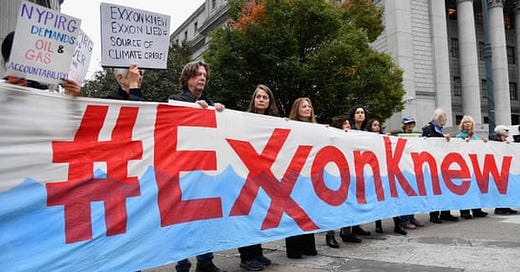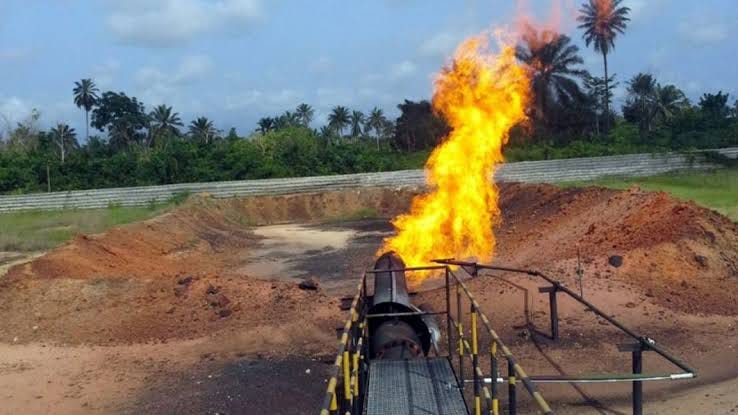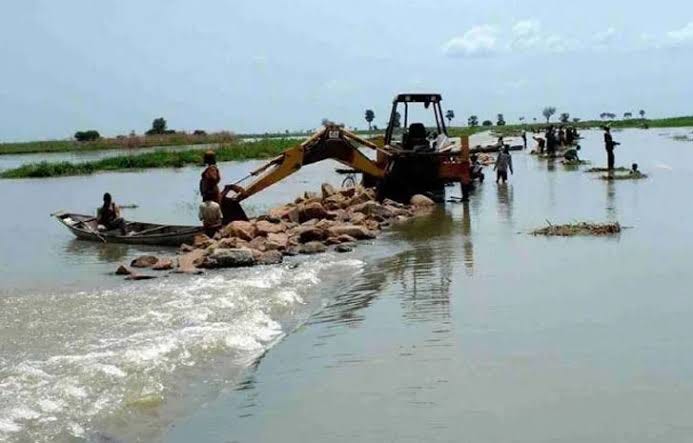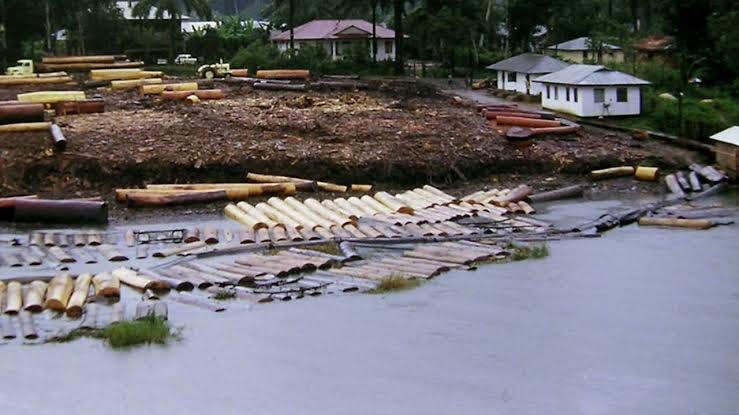Big Oil Companies, U.S. Lawsuits, Africa’s Climate Change Crisis
As fossil fuel companies face queries in U.S. courts, how does this affect Africa thousands of kilometers away?
Exxon must face a trial, according to the Massachusetts high court last week. Exxon must face a trial for its misrepresentations over climate change, for not telling the world what it knew. Exxon must face a trial for its activities in the past few decades, for lying about the relationship between fossil fuel production and climate change, for its operations in such areas as Africa, for misleading investors about the ways it carries out its business.
Big oil and secrets, Credit, Theguardian.com
In March, another court ruled against Exxon. The federal court refused to block a state’s legal actions against Exxon, ruled that the multinational oil company was obliged to turn over its documents to investigators for a scrutiny. The court ruled that Exxon could not act against the laws of the land, could not shield its documents against a scrutiny, could not hide its activities from the eyes of the public.
Just last week, too, a Rhode Island lawsuit confronted Exxon. It affected Exxon and 20 other fossil fuel giants, forcing the Rhode Island lawsuit to go ahead in a state court. It affected Exxon and the others, despite their efforts to move the case to a friendly federal court, despite their willingness to manipulate the judicial process in their favor, despite their reticence about allowing the cases go ahead in a U.S. state court.
Increasingly, Exxon finds itself arm-twisted by U.S. state courts over its fossil fuel production activities. It finds itself outmaneuvered by state courts, who want Exxon to turn over its documents to investigators for a scrutiny. It finds itself pushed into a tight corner, with state courts wanting to know how much Exxon knew about climate change in the past few decades, wanting to know the extent of Exxon’s misrepresentations, wanting to know how much Exxon has been concealing about the relationship between fossil fuel production and climate change, wanting to know the information Exxon hid about how its operations induced the climate change crisis in places like Africa.
Big oil on trial, Credit, Audioboom
It’s all because Maura Healey, the Massachusetts’s attorney general, suspects that Exxon knows much more than it admits. She suspects Exxon knows about fossil fuel’s role in the worsening environmental devastation in America, knows its key role in the global heating affecting all of us. She suspects Exxon knows so much more about the link between fossil fuel production and environmental devastation that she believes the company engages in a cover up, that the company needs to face a trial over what it prevents people from knowing.
The same thing happened with the lawsuit in March. It solidified the impression that Exxon knows much more about the link between climate change and fossil fuel production. It confirmed the impression that Exxon had been deceiving its investors and consumers, because if it had not been lying, it won’t feel so reticent about turning over its documents to investigators for a scrutiny. It emphasized the suspicion the company had been breaking consumer protection laws, breaking environmental laws, breaking all manner of laws.
The Rhode Island suit also shows that U.S. state judges suspect companies like Exxon. They suspect Exxon and its collaborators want to dodge accountability over their actions, want to hide how much they know about the relationship between fossil fuel production and climate change. They suspect Exxon and company misrepresented the situation about the climate change crisis, by preventing the public from knowing the truth, by attempting to move cases out of state systems to friendlier federal courts, by avoiding to hand over highly embarrassing documents revealing what they knew about the climate crisis.
These judges, because they suspect Exxon and its cohorts so much, feel compelled to make them face a trial, to make them face accusations over deceiving many about the climate crisis, to make them pay for misrepresenting their operations, to make them suffer for shielding their production habits in places like Africa, to make them cringe for complicating the rate of climate change.
Gas flaring in Niger Delta, Credit, Guardian, Nigeria
Exxon’s activities enabled it to evade consumer protection laws in America. It enabled it to take advantage of the shortage of consumer protection laws in Nigeria, so it could carry out unfriendly environmental practices. It helped it to heat up the coastal areas of Nigeria through gas flaring, making it pour greenhouse gases into the atmosphere with impunity, worsening the climate situation in this part of the earth, entrenching poverty through its activities.
In addition, Exxon pipelines spilled millions of gallons of crude oil into the Nigerian Niger Delta. Because of the story it told its investors in America, it got away the Qua Iboe oil spill on May 1st 2010, after which it declared a force majeure over the environmental pollution arising from the oil spill. Because of the stories Exxon told its investors in America, it got away with not compensating fishermen who suffered devastating losses due to the company’s activities through oil spills, got away with not paying thousands of farmers wrecked by its activities, got away with not paying businessmen ruined by its operations, got away with thousands of oil spills, big and small, in the Niger Delta.
Apart from the thousands of small and big oil spills, Exxon worsened the situation, while hoodwinking many about mitigating the effects of the oil spills. It fooled many by using dangerous chemical dispersants, saying they will clear the spills. It fooled a lot of people, because instead of the dispersants to clear the spills, they sank into the ocean and killed fresh fish eggs and fingerlings, thereby wiping out a generation of fish stocks and sea foods and marine creatures that make up the fish chain. Exxon fooled Americans over such activities like the Qua Iboe oil spills, fooled Nigerians about the usefulness of dispersants, fooled the entire world about the link between fuel production and the climate change crisis.
Fossil fuel exploration in Chad, Credit, The Independent, Nigeria
It did not only misrepresent the situation in Nigeria to its investors. It misrepresented the climate situation in Chad, after it discovered between 800 million to one billion barrels of oil in the Doba basin of southern Chad. It manipulated the situation after production started, after squatter camps grew outside the town of Kome, after girls looking for jobs turned prostitutes around the place, abandoning their homes in neighboring Nigeria, Cameroon, and the Central Africa Republic.
Just as it does in the United States, it allayed fears of the local communities over climate change issues. It persuaded them that production would not pose a danger to villages, would not affect their farming activities, would not impact negatively on their grazing lands. It convinced the local people, saying it would compensate them for any loss of arable land, for any inconveniences caused, for the grazing lands destroyed, for so many other things, all to make production of fossil fuel begin.
Many years later, the people living in the district of Ngalaba cry. Many years later, the residents of Maikeuri weep, because their source of livelihood disappeared after Exxon started production. Many years later, the inhabitants of Bendoh groan with pains from climate challenges, with their mangoes failing to thrive, with Exxon leaving its exploratory wells unplugged, with the people losing their lands and having nothing to show for the presence of the multinational company.
Needless to say, the Chadian story sounds painful because it shows an example of a people losing their lands and having nothing to show for it. It tells a tale about the people of Ngalaba weeping, as Exxon’s oil production activities altered their environment for the worse. It depicts the loss of farm lands, about prostitutes pervading the place after Exxon’s oil production activities started, of the company misrepresenting its operations to the local people, of humanity rendered helpless while oil exploration added to their climate change woes.
For climate change woes to come to a halt, Exxon must not be left off the hook by American state courts, because if the courts allow the multinational company off the hook, it would continue lying to investors and consumers about climate change. If it is left off the hook, the company will intensify the worsening of environmental devastation in Africa through its operations, accelerating the process leading to the breach of the 1.5C temperature limit. If the courts allow it to escape with this problem, it will evade trials for fueling the climate change crisis in Africa, lying about it, and then sticking tax payers’ money in Africa with continual bills of damages, causing them innumerable pains.
In addition, pressure should be mounted from Africa. Of course, some pressure have come before, but more pressure should come from the Africa continent, for Exxon to efficiently divest from fossil fuel. More pressure should be put on Exxon, to pick up the tabs for climate change costs in Africa, for taking the advantage of the public in the embattled continent. More pressures should be mounted on Exxon, so it pays for discrediting the science of climate change, for denying the threat posed by global heating, for deceiving the African public about the reality of environmental pollution.
The Niger Delta, Credit, The Guardian, Nigeria
Today, the coastal areas of Nigeria suffer as a result of Exxon’s activities through decades of environmental pollution. They reverberate through devastated farm lands, as Exxon refuses or refused to pick the tabs for climate change factors arising from its high-risk business. Many places in Africa suffocate through Exxon’s fossil fuel production activities, with the people having to pay continual bills of environmental damages, with the company lying about the science behind its activities, with the climate change crisis worsening, with the 1.5C temperature limits about to be breached. For the ordinary people in Africa to evade payments for its bills of damages, Exxon should face trials for not telling Africans and the rest of the world what it knew about the link between climate change and fossil fuel production.










Adetokunbo your writing is pretty outstanding, entertaining and informative. Keep it up boi!
Thank you for writing this